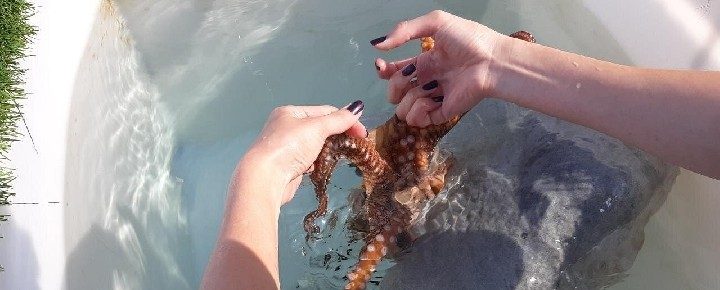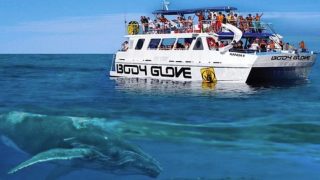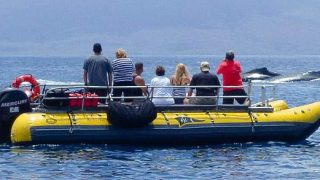The Kanaloa Octopus Farm in Kona on the Big Island once alleged it bred octopuses for food. On the other hand, the owner now says the purpose of the farm was research. No matter what was said, a hugely profitable petting zoo was being operated until last month. It was shut down for various reasons, which we’ll tell you about below. According to PETA (People for Ethical Treatment of Animals), this business “subjects animals to the stress of transport, alien environments, irregular feeding and watering, mishandling, and crowds of strangers.”
Farm made up to $108,000 a month through octopus petting.
Think about it from the animal’s point of view. You are a day octopus with a 1-year life span, captured and put into a big sink, then have 60 strangers a day petting you. For years the Kanaloa Octopus Farm operated in plain view. It was featured five years ago on a Honolulu TV Station in a segment sponsored by the Hawaii Island Visitors Bureau. After seven years in business, however, the farm was served with a cease and desist order in January. We’re left wondering why it took seven years to shut it down if the operation was not in accordance with the law.
Before it was closed, they were charging visitors $60 to pet a day octopus caught in the wild. The farm reportedly hosted octopus petting tours three times a day for a total of 60 visitors daily. It is reported that the farm holds from 15 to 20 animals in small 100-gallon tubs until they die.
The cease and desist order came from the Hawaii Division of Aquatic Resources.
The state told owner Jacob Conroy that the farm violated state law by possessing and breeding “regulated species of aquatic life without the required permits.” The state said it is also illegal to keep day octopuses of less than one pound, which may have been taken from a Big Island area without a permit.
Conroy claims that the allegations are incorrect and that he is working with the state to ensure complete compliance. He claims they do not “work with Day Octopuses under one pound.” He also claims that most farm octopuses come from local fishermen who typically sell them as fishing bait. Conroy said, “Our octopuses are typically injured animals others don’t want. We feed them and care for them, allowing them to recover.”
An interview with the farm manager conflicted with what the owner alleges. He said they work with octopuses of less than 1 gram in weight.” He also said that the animals come from someone “who actually catches them for us. He’s just really good at it. He just knows how to find octopus.”
The owner contradicted the employee and said that the octopuses being referred to are of the crescent variety, which is unregulated.
The state says a permit for “special activities” is needed to continue operations. If issued, which appears unlikely, that would permit taking or possessing the otherwise prohibited octopuses.
In the interim, visitors to the octopus farm should know that the operation is closed. We were told that the farm is now focused on squid farming instead.
Visitors may have been misled into thinking they were helping.
In countless comments found on social media, visitors noted that they were happy to be helping octopuses through these petting tours. One recent visitor said they were glad to be “Helping them survive. We enjoyed interacting with them: feeling their tentacles wrap around our fingers, watching them change colors, seeing them intrigued by toys, and even feeding them shrimp!”
Another recent comment included, “Being able to interact with the Octopuses and feel them wrapping their tentacles around my fingers was a truly exceptional and rare experience. Looking into their eyes… is amazing. Where else could you enjoy this experience?
But another visitor just before the operation was closed said, “We were saddened to see the octopuses in plastic tubs and not a natural environment. They have been trying to breed them since 1970 without success. This is not a research facility, as we are led to believe, but a tourist site. Octopuses are intelligent animals, and we were sorry we helped finance this business.”
Octopus farm runs afoul of both authentic research and animal rights.
The Kanaloa Octopus Farm has been criticized for its cruel treatment of day octopuses. The animals are described as intelligent, playful, and curious. It’s widely alleged that the operation was merely a very profitable “petting zoo” where wild animals were caught and imprisoned in “sinks” to entertain high-paying visitors.
On the other hand, the owner and farm manager both contend they are researching the breeding of day octopuses so that “in case anything ever does happen to the (wild) populations,” they will have the means to reintroduce them. That appears not to be the case, however. Scientists have said that raising octopuses from eggs in captivity is impossible. That has been tried and failed in both Spain and Japan.
More octopus legislation is upcoming.
States are looking to move against octopus farms after the Big Island one went public. Washington State has introduced a thus far unopposed bill to ban octopus farming. There is currently no federal or state protection for octopuses.







The greedy the human species & what great lengths humans go to exploit, every living beautiful creature gifted to us.
Is this not why we have government.
This company should never bee Allowed to operate 7 days little alone 7 years!
.. for those of you that paid to have Octopuses wrap around your finger…you can sugar coat it anyway you want but Your just as greedy to experience this.
Those poor creatures living in a tubinstead of thier natural habitat!!!
I am so saddened to hear that the Kanaloa Octopus farm has been closed down. We have enjoyed and visited this farm every trip since we heard about it. Calling it a petting zoo is a misleading statement. There is no way you can pet the octopuses. They choose to interact with each person. The choice is totally theirs. And they decide who they want to interact with.
I saw only care and concern for the octopuses when I visited them. And the interaction with the Octopuses were one of the highlights of my life.
The National Resource center for Cephalopods (Galveston Tx.) has been breeding Squid, Octopuses and cuttlefish for decades for biomedical research. The problem is that all cephalopods have an incredibly poor FCR (food conversion ratio) which means a lot of money to feed and close the cycle. In Conroy’s touch tank, it is either lack of skillset to raise Octopus or non desire to invest in feed infrastructure to raise the larvae. Much easier, cheaper and profitable to say its impossible and let folks just play with them for a fee.
What is as outrageous is the fact that the Natural Energy Laboratory of Hawaii Authority (NELHA) allowed an illegal activity to go unchallenged for 7 years
I find it even more outrageous that the State of Hawaii had this going on, advertised in multiple media forms, and they knew nothing about it?
How about those whale war episodes where the Yishin Maru whaling ship has the word “Research” on the side if it. They are only lying to themselves. We all know it’s a commercial whaling ship.
I am curious how this is any different than the seahorse farm on the Big Island? As cool as it was to see seahorses there I’m pretty sure they too would be happier in their natural environment.
I agree. We recently visited the seahorse farm on BI. While my 5 year old daughter loved it, I was skeptical. The tour guide said the top reasons for seahorse endangerment are climate chance, overfishing, and the pet industry. Yet they are raising the seahorses to be sent off as pets to people. It had me raising an eyebrow, and left with an uneasy feeling.
I too can understand why you feel uncomfortable. Until there is some kind of controls in place on the “industry” and ethical standards I wonder if this would be the answer. “Farming” of aquatic species could be the answer to continually robbing the ocean, but how many of these would be needed to supply the wants of people? Controls must be placed.
Nobody made a film called “My seahorse teacher”
I feel that the State of Hawaii is doing the right thing. And the $60.00 charge is insane. Did the owner think about human skin conditions and transmissions? Thank you to Hawaii and PETA for their hard work.
Greed never ceases to find new areas to exploit. Would these same people enslave people claiming to be Researching how to counter and deter others from Slavery? Surely it appears that way. 😳 Inter species Slavery ending in death, if extraterrestrials are real is there any doubt as to why they don’t want to meet humans?
The plural form of Octopus is definitely not octopuses. As a journalist you should know better!
Octopuses or octopods are both correct
Is that all you got out of this article… teacher????
Really?
How did this happen? Follow the money. That’s how it happened. I mean this company was promoted on TV shows, the internet , at etc. Hawaii government straight up allowed this to happen.
Outside haoleez who migrate to Hawai’i who practice further exploitation of native Hawai’ian creatures of the sea which is similar as raping the tide pools and coastal reefs of native fishes for personal aquariums worldwide.
They couldn’t do this in plain site without a business license and permits. Say what you want about haloes John, but they wouldn’t be doing this without the blessing of big government. So it’s either straight corruption or laziness . 7 years is a long time to be operating a ‘illegal’ business that’s not hiding what they do
I wonder if competitive spearfishing is as bad, as it’s not like we see competitive spearfishers protesting and picketing to end commercial fishing. Hmmm.
That’s exactly what we were told, that they were breeding them to save them from extinction.
So this is the Tiger King of Big Island… Octopus King!
Keeping animals in captivity and putting them on display for the so-called entertainment of humans is something I find reprehensible. If it were up to me, zoos would be outlawed. As I’m sure I’ll catch a lot of flack for these comments, before you press the send button consider this: zoologist generally agree that the octopus is the most intelligent animal, second only to the human. Yes, they are smarter than Fido and Ms. Kitty. Would you ever accept a dog or cat petting zoo? A place where they put a dog or a cat in a cage and then people pay money to come around and touch them? This octopus farm, supposedly carrying out “research” (have they ever published anything? No? That’s what I thought.) is an embarrassment to us all.
Please protect these highly intelligent creatures. Now I know of this I will be vigilant to shut this type of crapp down. It will be blasted on social media
No zoologist would ever say that the octopus is the second most “intelligent” animal after humans. That’s extremely laughable. By far, octopus lack mammalian intelligence. Cetaceans, elephants, and apes are all “smarter” than octopus; even cats and dogs probably have more to offer in that department.
Zoos also are incredibly important for conservation and research. Your statement is incredibly misinformed and I’d highly encourage you to read peer reviewed papers. That being said, Kanaloa Octopus Farm isn’t an accredited institution, nor have they offered any meaningful research towards the day octopus lifecycle that I’ve seen. So, in that one thing we can agree.
I wonder how many zoologists you actually have spoken to? Insofar as animal intelligence can be measured, the octopus ranks extremely high on the list. Maybe not all experts rank it as “the smartest” but certainly above our beloved cats. My point (which you seemed to have missed) was that trapping and displaying an octopus in a tank for show and tell should be no more acceptable that doing the same to a dog or cat. Some things don’t require peer review publications to understand. Mahalo!
Anything to make a buck! And anything to entertain tourists. This reminds me of the dolphins that are put in captivity to go have people pet them and take selfies with. When will people ever start to understand that Hawai’i is not Disneyland?
Agreed. You hit the nail on the head. It’s all about money. Tourists will stop thinking of Hawaii as Disneyland as soon as the marketing teams of these huge corporations stop advertising Hawaii as such. We also need to stop referring to the islands as “Paradise.“ HI is clearly not Paradise. One can celebrate the beauty of a place without referring to it as something that no living human could ever experience anyway. Yeah, Hawaii is not paradise. I think I’ll make a bumper sticker.
I agree with you and funny you mentioned that because Waikaloa hotel has dolphins in captivity for people (mostly tourists but locals do enjoy it too)to pay to swim with and take paid photos with and have you ever seen how much it costs to do that and also to stay at that hotel,it’s beyond insane to me!!!!shame on them!!
So we just left the Big Island and on our last day we went to the Seahorse farm…like some of the reviewers for the octopus farm we felt honored to have these magestic creatures interact with us. I most cried to be honest. But now on my plane back to the mainland I am reading this. Please let me know if they are practicing safe protocols? If they are not I will be very disappointed in the company. My husband said there were a few things said about breeding the seahorses that seemed “off”…thanks for this article! We love reading your emails!
Mahalo 🌺
Hi D R.
Thanks. We’ll see what we can find out as you’re not the first one to mention it.
Aloha.
Ocean Rider Seahorse Farm is the real deal. For many years they have been doing bona fide seahorse aquaculture, to the point that their seahorses can now be considered domesticated because a number of their behaviors are completely different from those of their wild cousins.
Unlike the defunct octopus petting zoo which produced nothing, nada, zilch, the seahorse farm produces seahorses for those in the aquarium hobby, saving hundreds of thousands of wild seahorses that would have otherwise been captured in the wild by wildlife traffickers for sale to pet stores.
OK. Let me understand your argument here. The sea horse farm is OK with you because it catches , breeds, domesticates and then sells sea horses to aquarium hobbyists. The other guys that “poach” seahorses and then sell them to aquarium hobbyists are not OK. Please explain the difference in terms of the ultimate outcome, which is that seahorses are removed from their natural sea habitat and end up swimming up and down a small glass cage. . Thank you.
Good question Eldo. Aquaculture takes very few animals from the wild compared to wildlife traffickers which take literally hundreds of thousands every year. Aquacultured seahorses can live for over 14 years, nearly 10 years longer than seahorses in the wild. They are born in captivity and well-adjusted to captivity. Here, aquaculture is literally saving hundreds of thousands of seahorses every year.
I’d like to believe you, Rene, really I would. But I am skeptical of your assertions. For example, “well adjusted” seahorses? How is that measured exactly. “Literally” saving hundreds of thousands of seahorses “every year?” How was that number arrived upon, pray tell – is there a world-wide seahorse tracking system and database? And I wonder what the survival rate of these poor seahorses that are sold to the public actually is. Did you know that barely 50% of the tropical fish shipped to hobbyist pet stores across the USA actually survive to their final destination? A mortality rate of 50% is hardly laudable. Just saying…
Eldo, I run an organization dedicated to protecting coral reef wildlife from the aquarium pet trade. Our work has helped save millions of fishes and other creatures in Hawaii from that trade in the last 5 years alone. You might be interested to know that far fewer than 50% of wild fishes captured on reefs in the Philippines and Indonesia — the world’s 2 largest source areas — survive long enough to make it into a hobby tank. We’re talking about millions of animals every year. People like keeping aquariums, but most don’t know they’re buying wildlife. Supporting aquaculture is key. Yes, there is publicly available data on the trade in wild seahorses for the aquarium hobby.
Thank you for explaining the difference
The difference is that the seahorses have entered into domestication, with captive breeding providing the animals for sale. This is the same as cats, dogs, chickens, ducks, geese, pigs, cattle, sheep, goats, and so on.
Oh, so this is the seahorse equivalent of a puppy farm?
Got it.
Very well said…. I don’t understand the difference either those poor wild sealife creatures are all stuck in captivity for obscene reasons and costs which makes zero sense to me
Research and captive breeding is more realistic than just letting people fish out the various species of reef octopus. The few that were available to interact with visitors were rotated out and stressing them was not encouraged. Breeding was a careful process and hopes to help survival rate drove their research. In the 45 minutes we spent with them the speaker told us more about octopuses then covered in any biology class could in that time. It inspired many to see the beauty in this seemingly foriegn creature. Forget eating them,We are not so desperate for food like in the days prior 1900. A curious question i pose, what about the seahorse farm up the road from them? They may not be a food animal but selling as pet, flying them to the US?
The quote from the farm manager, “that the octopus are less than 1 gram” is nonsensical.
One gram is only .0022 pounds, about the weight of 15 grains of sand.
I am sure people would not be petting and playing with an octopus the size of a BB.
Agree Rob T. Something does smell “fishy” about their respective stories. Pun intended.
I just read the book Remarkably Bright Creatures by Shelby Van Pelt. It was about an octopus who was in captivity in an Aquarium. It was fascinating. I didn’t realize that they were so intelligent.
I’m glad that they shut this operation down.
All those years of visiting Hawaii and I didn’t have a clue. This is total nonsense and octopus don’t live very long.
What i find hard to believe is that they operated in a highly visual manner and nobody from the State even looked.
To busy not doing their job and collecting towards their pensions.
The state officials overlooking this type of infractions are most surely payed to look the other way . They’re all in kahootz and don’t be naive to think otherwise
Sounds fine. Must we regulate everything? Seems like they were not being mistreated by the “petting”. More liberal over-reach…
The owner of the ctapus farm should be prosecuted to the fullest extent of the law. Same with his supplier. This had to have been horrible for the animals. Thank goodness PETA got involved. He should not have any animals as he surely does not make sure they are properly cared for.
Yes we must regulate everything when it ruins Hawai’i. People like you think anybody should be able to do anything they want anywhere there please. You sound like you’re one of those snorkeling boat operators ruining each spot.
Nothing to do with “liberal overreach” but more to do with humane treatment of a species that has been proven to be second to humans in intelligence. I’m sure no one would want to have their favorite dog or cat in very tight quarters, never experiencing free roaming of home or the outside, but being “petted” by strangers. And, as much as I love my dog and friends’ cats, they cannot compare to an octopus. Having respect and compassion is bigger and more important than political triggers.
Please tell me where all of you are finding this source that octopus are the second most intelligent being on the planet? It’s insane how far off the mark you are! Typically, we associate animals that are social to have more “intelligence” — octopuses are Solitary. They don’t have problem solving skills that are anywhere near the level that we see in mammals.
Dolphins and elephants have been proven to be smarter. At least we have some evidence of them being self aware, something that can be said about octopus.
No Larry, it clear right wing greed at the expense of torturing a living thing…